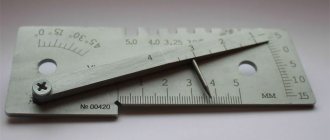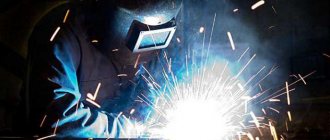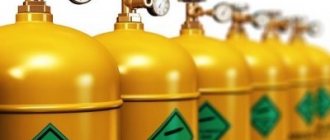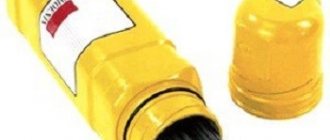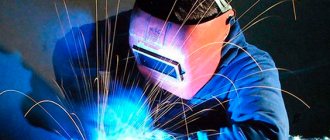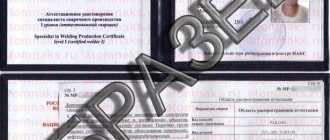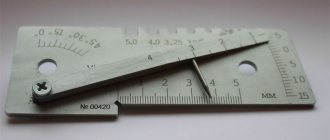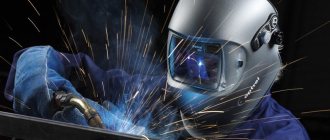Pros and cons of the professionSalary and careerSalary as of July 24, 2021Where to study
A welder is a metal specialist who joins metal parts into complex structures using electric welding. By the way, in 2021, the ProfGid career guidance center developed an accurate career guidance test. He himself will tell you which professions are suitable for you, and give an opinion about your personality type and intelligence.
Welder is a working specialty and involves working in welding production. The specialist is engaged in connecting metal structures, parts, products, containers and pipelines of various types, composition, purpose and level of complexity. The quality of work and welding seams depends on a professional welder. In his work, mistakes are not made that could lead to catastrophic consequences. The profession of a welder is divided into several specialties: gas welder, manual arc welder, operator of automatic welding machines.
Pros and cons of the profession
Pros:
- high demand in the labor market;
- fairly high salaries for experienced welders.
Minuses
- difficult working conditions (sometimes you have to work in extreme conditions, at high altitudes or under the influence of various meteorological factors);
- heavy load on vision due to the high brightness of infrared and ultraviolet radiation, electric arc (the appearance of the disease electroophthalmia);
- the presence of other occupational diseases due to inhalation of industrial dust (silicosis, pneumoconiosis, bronchial asthma).
general information
Welder is one of the most in-demand working professions at the moment. Professional welders easily find work, receive decent pay and additional benefits for health risks.
Yes, welding is not the easiest job. Sometimes you have to work in difficult conditions that negatively affect your health. In addition, welders often experience vision problems, despite the use of a protective mask.
However, with full compliance with safety precautions and the Labor Code, such work causes minimal harm and at the same time provides a stable income in any country. There are more and more cases when our compatriots move abroad and get jobs there in welding production.
Salary and career
There is a shortage of technical specialists in Russia, so the salary of a first-class welder can exceed the income of a middle manager. Young specialists receive about 20,000 rubles, the salary of experienced high-level workers (the sixth highest category, assigned to highly qualified specialists) averages from 30,000 to 45,000 rubles monthly. But, as with other professions, the amount of a welder’s salary depends on the place of work, experience, hard work and desire to constantly improve their skills. Thus, the lowest salary for specialists is in the housing and communal services sector, and the highest in the oil and gas industry.
Typically, college graduates do not have to look for a job for a long time. Welders without experience are accepted into private service organizations and housing and communal services. With the acquisition of experience, young specialists are already entrusted with more responsible tasks and work in industry and construction sites.
Is it possible to work for yourself?
Can.
This can be organized as a part-time job (if you work as a welder in some company and want to earn money after a shift or on weekends). How you can earn extra money:
- make some simple products to order (for example, pipe stoves);
- weld simple structures: fences, gates, tables for cottages or garages, racks, benches, canopies;
- engage in artistic welding: create and sell jewelry, souvenirs, interior or exterior items (example);
- weld reinforcement when arranging the foundation or during monolithic construction;
- find small (or medium-sized) companies that periodically need a welder, but not so often as to keep him on staff (for example, construction and repair teams, companies for the installation and maintenance of utilities, for the production of garden furniture);
- cook and repair products for cars, agricultural machinery, special equipment, and do body repairs.
If you already have experience (you know how, what and with what to cook correctly), you can try working for yourself. But this is relevant mainly for large cities - in small towns, orders may not be enough for a normal income.
Accelerated courses for welders 1-6 categories
Accelerated courses are also in demand, allowing one to study to become a welder using a “short” program and presupposing that the student has a certain rank, qualifications and knowledge.
Welders are assigned a certain rank, indicating how much knowledge the worker has in a certain area:
- Master in welding plastic products. His responsibilities include installation and disassembly of structures, performing preparatory work, and welding plastic elements.
- Master of thermite welding, proficient in reading blueprints, arc and plasma technologies.
- Master of RDS.
- Master of arc and plasma welding.
- Specialist in connecting complex elements and assemblies - vacuum structures.
- A general master who knows all welding methods at a high level.
A 6th category specialist can work in any industry, including the gas and oil industries.
Courses
Training to become a welder is carried out in groups in specialized classes with demonstration models of technological equipment.
To obtain a welder's education, it is necessary to master a curriculum that provides practical skills and theoretical knowledge in handling welding.
To train as a welder with subsequent employment, internships are required in construction and industrial enterprises, factories for the production of metal structures.
The curriculum includes the following topics:
- Basics of welding technologies. Students gain knowledge of the theoretical fundamentals of arc welding; when changing the direction of study, the plan also includes basic topics on argon welding.
- RDS - technology of work production, fundamentals of processes.
- Electric arc welding.
- Training to be a welder working with semi-automatic machines.
- Gas welding and cutting.
- Argon arc (TIG) welding – training of argon workers. Cold welding, submerged arc welding, carbon dioxide protective environment and other media.
- Studying defects and producing quality control.
- Basics of safety during welding work.
Moscow colleges specializing in “Welder (electric welding and gas welding)”
University College
State diploma. Based on 9th and 11th grades. All forms of training. No exams or Unified State Examination.
College of Information Technology IT HUB
Specialties of the future. Internships in large IT companies. Admission without OGE/USE. State diploma. In-person and online training.
MAP under the Moscow Government
Without exams and Unified State Examination based on grades 9 and 11. State diploma, 9 directions, all forms of training. College-university program.
- State
- With budget places
How to find a job after studying
Here are some tips to help you build a career in this in-demand specialty.
- Send your resume to businesses and organizations in your city . The first job placement is the most difficult, since not all employers will be ready to accept a young applicant without experience. There are more chances to get a job at enterprises in the housing and communal services sector: welders are needed in housing and communal services, water utilities, and heating network departments.
- Improve your skills whenever possible . If an employer offers training, you should not refuse. If it doesn’t offer it, a year after you start working, pick up and take the courses yourself. The assignment of a new rank will have a positive effect on wages.
- Choose a specialization . Universal specialists are good because they can work in any industry. And “narrow” - because they have exclusively professional skills in certain areas, for example, hull welding of ships or connecting pipeline elements. Such specialists are highly valued.
- Try different objects . The more practice a welder has, the better. And the more projects he completed, the more employer companies keep his resume in their database. Over time, the need to search for work will disappear: high-level professionals are regularly invited to sites in Russia and abroad.
Working on a rotational basis may be scary, but in practice, especially for a young specialist without a family, it turns out to be not such a bad decision. Shift workers are paid for travel, accommodation and food. As a result, all earnings during the shift period remain in hand.
Training course program
The welding training program is based on the student's step-by-step and gradual acquisition of cutting and welding skills.
To train as a welder, they first take a theory course, and then practice, which takes up about 70% of the hours of the educational process..
Welding training also involves studying:
- rules and regulations of industrial safety at facilities subject to control by RosPotrebNadzor;
- providing first aid to victims;
- study of all types of devices - transformers, inverters, generators;
- electrical safety and electrical engineering course.
History of the profession
People have been making composite products from metals since ancient times. In fact, the first welders were blacksmiths who, by means of mechanical action (hammer blows) on pieces of iron heated to a plastic state, permanently connected them.
After the discovery of electricity in the 19th century, methods for joining metals using an electric arc began to be developed and constantly improved. In the USSR, the most famous specialists in this field were Evgeniy and Boris Paton. Until the 60s of the 20th century, only the profession of manual welder existed, but since that time special robots have appeared that are being used more and more widely, especially when working with complex projects.
Where to go to become a welder?
In the last decade, a tendency has emerged to choose specialties related to mental work. Demand for blue-collar professions has fallen among applicants; many consider them “unpresentable.” But labor is always needed, there are fewer specialists in these areas and they become more valuable, i.e. wages rise. The profession of a welder is one of the workers, which is difficult to overestimate in the modern world, where everything, literally, rests on metal structures.
Description of the course. What is included in the theoretical and practical parts?
Welding training is provided in colleges and specialized courses. Having completed welding school, the student receives the necessary knowledge. The cost of training depends on the region, the prestige of the institution, and the rank received. There are also advanced training courses for welders who have already received rank and experience.
Upon completion of the training course as a gas or electric welder, exams are taken on the theoretical and practical parts of the profession. If the test is successfully passed, the student receives a standard diploma.
Welder exams after 9th grade: what to prepare for?
Reading time: 2 minutes
If you like exact sciences and want to quickly get a job that is in demand, pay attention to welding. Every year, thousands of schoolchildren decide to become a welder after the 9th or 11th grade, and we consider this choice to be rational. Welders are in demand both here and abroad.
In this article we will tell you what subjects you need to take to become a welder, how many years to study and what you need to take into account in order to obtain the sought-after profession of a welder.
Medical restrictions
There are almost no contraindications to becoming a welder. But if a person has hearing, vision, musculoskeletal disorders, or some mental abnormalities that may prevent him from working with equipment, unfortunately, the path to the profession will be closed.
Also, welding is usually not taught to people with hypertension, respiratory diseases (even bronchitis), as well as claustrophobia and acrophobia. Welding work can be carried out in different conditions, so fear of confined spaces or heights can interfere with concentration, and therefore the completion of the task.
Since not only men, but also women can be welders, their medical contraindications are even stricter.
Education
If you are interested in this profession, the main question will probably arise: “How to apply and what exams do you need to pass to enter?”
The answer to these questions depends on the school you choose. Now welders are trained in schools (vocational schools), colleges and technical schools. There are even universities that train welders.
If you plan to enroll after 9th grade, then vocational schools, colleges and technical schools are your choice. In most cases there are no exams required. It is necessary to pass the in-school OGE in any subjects and have a certificate with an average score of 3 or higher. For free training you need to have a certificate of 3.7-4 points.
What an electric welder should be able to do, working conditions
To successfully work in his specialty, an electric welder must know a lot and be able to do even more. As mentioned above, making a strong and even weld (especially when working with refractory products) is an extremely non-trivial task. This can only be achieved with many years of practice and continuous training.
However, already at the initial second level, an electric welder must know and be able to do several things:
- the principle of operation and design of welding machines on direct and alternating current, how they differ and how to handle them;
- what types of welds are there?
- how to properly clean surfaces before welding;
- properties of metals and various alloys, how they behave when welded;
- methods for eliminating welding defects and the causes of their occurrence.
If we are talking about automatic electric welding, the worker must be able to maintain and eliminate minor malfunctions of the automatic welding machine.
Of course, the norm of life for any electric welder is strict adherence to safety rules when working with electricity, installation work, etc.
Electric welders usually work outdoors - especially when it comes to laying pipelines, welding bridge structures, or erecting cell phone towers. Very often these are 30/30 or 45/45 day shifts, shift work in almost any weather.
So to work as an electric welder you will probably need iron health and excellent endurance.
What documents do an electric welder need?
To get a job as an electric welder, you will need an impressive package of documents:
- Qualification certificate (valid) with the designated category;
- Diploma of education from an educational institution (vocational school, college, technical school);
- A certificate with an electrical safety permit of at least group II;
- Certificate of passing the fire-technical minimum (FTM);
- The welding machine itself (if it is owned by an electric welder) must also have a quality certificate and a technical passport;
- Conclusion of a medical commission on suitability to work as an electric welder.
You should also pay attention to the documents issued by the educational institution. It must be in the so-called NAKS register - an independent organization for monitoring welding work.
To work on complex and critical projects (for example, bridge construction), an electric welder will need a special NAKS certification certificate. It is issued by the National Welding Inspection Agency - hence the acronym. This is especially true for high-grade welders (6 and 7). For them such a certificate is mandatory.
At the same time, electric welders undergo three types of certification in NAKS: when they take the exam for the first time, when it is necessary to take retraining courses using the NAKS method, and also when, if they urgently need to confirm their qualifications. The latter case is possible if the electric welder changed jobs and got a job in another organization.
Estimated cost
Approximate prices for studying to become a welder in educational institutions after graduation are given below:
- In college - 38,000-62,000 rubles per year .
- At a vocational school - about 45,000 rubles per year .
- At the training center - 9800-18000 for the entire course .
The approximate cost of courses depending on the specialization and number of hours is shown in the table below.
| Specialization | Number of classes | Approximate price in rubles |
| Argon welder | 15-20 | 16000 |
| Electric and gas welder | 18 | 10000-12000 |
| Electric welder | 12 | 15900 |
Buying a welding diploma will cost about 18,000-24,000 rubles . This service is usually used by people who cannot get the desired profession or who already have an engineering specialty, but are dissatisfied with the level of their wages.
Responsibilities of a welder
When starting work in production, a specialist gets acquainted with the job description, which outlines the range of his immediate responsibilities. During work, the welder must:
- produce quality products;
- observe the welding regime;
- plan deadlines, expenses, volumes;
- order the required materials;
- maintain reporting documentation;
- comply with safety and labor protection standards;
- increase productivity (if possible);
- improve and modernize existing technologies.


